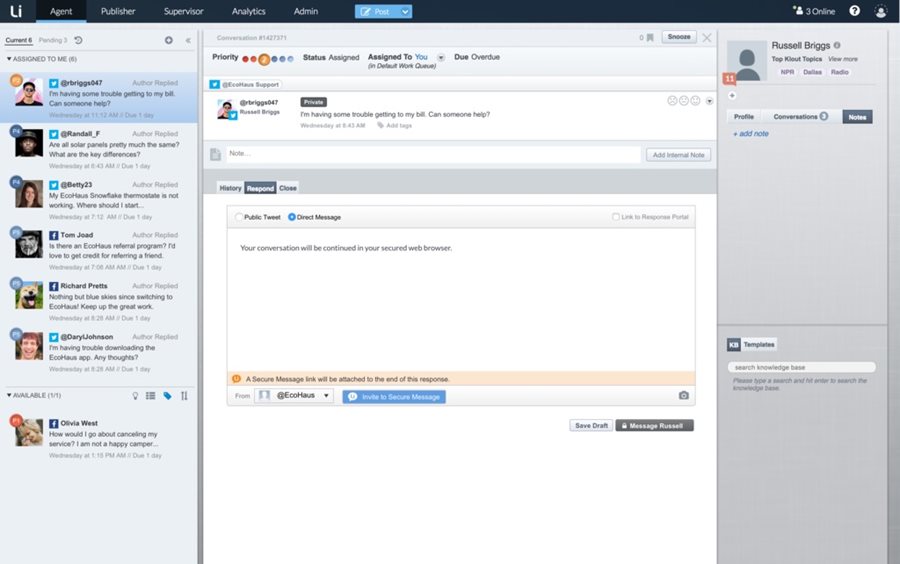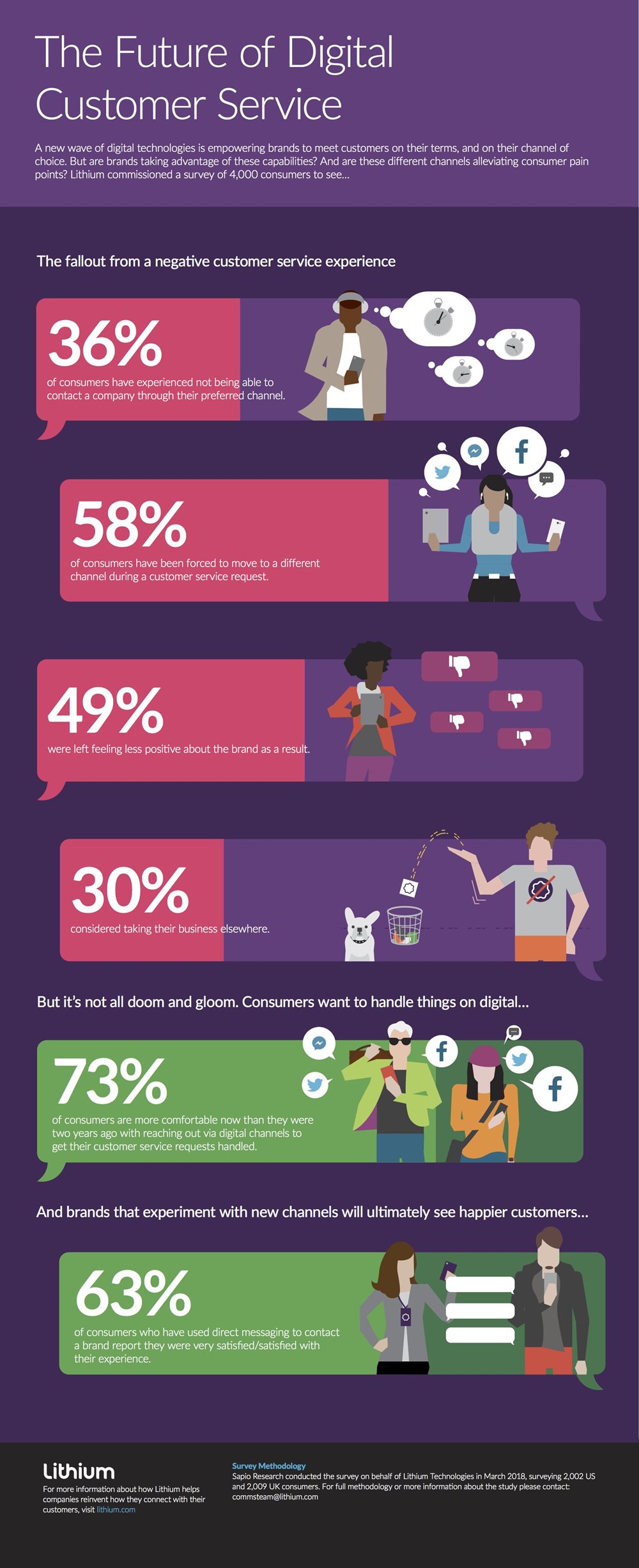Lithium Elevates Digital Customer Service for Brands
Great customer service will say many things about an organization very quickly. For me, it  says there has been an accurate allocation of budget towards creating an effective support staff, careful choice in the technology to empower them to best do their job but above all, it shows the brand doesn’t mind making the necessary investments to show they value their customers.
says there has been an accurate allocation of budget towards creating an effective support staff, careful choice in the technology to empower them to best do their job but above all, it shows the brand doesn’t mind making the necessary investments to show they value their customers.
On the contrary, a bad customer service experience can say just as much, and when I experience it myself I am often left wondering: with the high cost of acquiring new customers only aggravating the financial impact of losing current customers, and the way in which brand reputation can be precarious given the pull word of mouth and social conversations have these days, how can an organization afford to treat their customers poorly?
They do afford it though, last year it was estimated U.S businesses lost $83 billion as a direct result of poor customer service. You would think with the advent of technology that number would be decreasing but unfortunately it isn’t, rather it’s the delay brands have to communicate with customers on their preferred digital channels that is partially to blame and I don’t just mean conversations on social media. Brands need to be investing in a dual approach to cover all types of conversation platforms. After all, Gartner expects that by 2019, requests for support by customers through their consumer mobile messaging apps will surpass requests for support through traditional social media.
To address this issue, today Lithium Technologies released Lithium Messaging, allowing brands who already use their platform to connect with their customers through their preferred digital conversation channels. Supporting all the platforms consumers are typically using for their one-to-one conversations such as Twitter, Facebook Messenger, SMS, WeChat, Communities, web and mobile apps, Lithium plans to add many more within the year.
Riding the wave of change digital customer service is experiencing, Lithium Messenger is giving brands the opportunity to connect more personally with their customers, using the channels consumers would use to interact with their friends and family. The conversations themselves are threaded, eliminating the annoyance faced by customers when they have to repeat their query as they move through the service chain. There are benefits for the customer service agents as well, they can communicate with customers on various channels with full access to review and collect customer information in a secure and brand-owned environment.

Lithium CTO Discusses Digital Customer Service
Executing effective customer service on the digital plain seems to be a struggle for even some established brands, with problems existing that seem highly solvable and just don’t make sense from an economic standpoint. Advances like this one could also bolster the more incumbent brands who previously excelled at customer service who are struggling to transform that experience in competition with their new, more digitally native competitors.
Given Lithium’s forward thinking on the topic, I wanted to inquire with the network of minds behind this release to hear their thoughts on the innovation surrounding digital customer experience, the interplay of artificial and genuine intelligence in tackling this task and, if brands should utilize the technology available to them to be more proactive in engaging their customers before they are left to just be reactive in the face of an issue. Lithium’s CTO, Raju Malhotra fielded my questions below.
Some platforms are utilizing machine learning and artificial intelligence as the front-line in managing customer service inquiries, in an attempt to minimize the impact on personnel resources within a company but, with the same premise of accuracy and efficiency, you’ve chosen to equip real people with the means to do the job most effectively. What are your thoughts on the debate of artificial vs genuine intelligence taking on the responsibility of handling customer service inquiries?
“We invest heavily in AI but favor the genuine intelligence versus the artificial one. AI for businesses  has dominated headlines for well over a year now. While a lot of brands are integrating automation and chatbot capabilities or at least beta testing them, the code of when to deploy a bot vs. human has not quite been cracked yet. That’s caused some consumer frustration. It’s actually similar to when customer service call centers began shifting to automated answers, and the brands that ended up benefiting in the end were those who still offered the option of a human on the other end of the line.
has dominated headlines for well over a year now. While a lot of brands are integrating automation and chatbot capabilities or at least beta testing them, the code of when to deploy a bot vs. human has not quite been cracked yet. That’s caused some consumer frustration. It’s actually similar to when customer service call centers began shifting to automated answers, and the brands that ended up benefiting in the end were those who still offered the option of a human on the other end of the line.
Clearly, there are potential efficiencies to deploying automation like bots and, as such, every company should be at least starting to think about how to deploy them. But the key is in balancing this with the human touch, knowing when an automated answer will suffice, or whether a more nuanced interaction is required.
It’s crucial to remember that while AI can streamline and scale customer care, it’s your amazing people that really drive your brand’s customer experience. We want to empower those real people with artificial intelligence capabilities to gain higher productivity without compromising a personal touch.”
In the press release it states: “Lithium Messaging processes a brand’s digital conversations across web chat and mobile apps – tagging, prioritizing, and routing customer queries to the right agents for fast and accurate responses.” Can you go a bit more in-depth on the process of matching the different queries with the right agent to address them? What would the characteristics of the query or agent be that determine who gets which conversation?
“Our AI algorithms along with the company’s business rules route and prioritize questions to the person best equipped to answer them. For example, a large company may have multiple product lines, and not every customer service agent can expect to be an expert in all of them. So through keyword tagging we can identify what product category the question needs to go in, and route it to the agent who has expertise in that area. Also through our proprietary recommendation engine, our system can identify how urgent the matter is, and escalate it accordingly.”
With the management of customer service inquiries growing in efficiency, what are your thoughts on brands being more proactive in starting or encouraging a dialogue with their customers earlier or more often than just when an issue arises and the customer has to inquire for assistance?
“We absolutely believe that brands benefit in the long term if they engage with their customers proactively themselves and allow opportunities for them to engage with other customers throughout this process.
The key is to identify customer issues well before they become trends on social media. In fact, a recent study we ran found that 71% of consumers will stop using your brand when treated badly, even if they love your product. Smart brands know that a proactive and genuine response to any issues can actually help improve customer perception of your brand.
However, sometimes it is not what you say to them, but what your customers say to each other about you. To inspire more reviews and help negate customer issues, actively ask your consumers to share or review their experiences, then post those reviews everywhere you can—online, in-store, and at every touch point. These active community members will also come to your aid when a customer has a question or issue.”
Secure Verification is a pertinent feature to highlight given the heightened awareness many consumers now have surrounding the security, collection and use of their personal data. Can you expand on the importance of this to your organization?
“Customer verification is a required step in any customer service scenario while accessing any sensitive information. Traditionally brands have had to ask their customers to shift channels (say SMS, public social media, etc.) to one where they can receive and verify personal information, at times even asking them to use the phone to call them. This is not only frustrating for customers; it is also not cost effective for brands.
Lithium Messaging provides the Secure Verification feature so brands can own the data exchanged and securely collect personal data to maintain compliance needs. This is a much improved customer experience as well as a better ROI for brands."

Ending Notes
In March 2018, Lithium Technologies commissioned a survey through Sapio Research, surveying 2,002 U.S and 2,009 U.K consumers to understand their thoughts on how brands are utilizing digital technologies to manage customer service. They captioned some interesting statistics about the impact a negative customer service experience has on a consumer (shown below), but what’s most encouraging is that it shows consumers respond well not only to their interaction but their experience with brands that are making efforts to personalize the conversations and channels of communication.
Earlier I said that brands were affording to offer bad customer service, as I resist to use the term ‘lost’ when it comes to describing where that portion of revenue runs off to. It’s not a mystery where it goes, when a consumer disengages from a brand because of a bad experience, the money either stays with them or goes to a competing organization. When it comes to customer service, the customer is making an effort to engage with a company and right the wrong they have encountered, for an organization to not effectively take that opportunity to mend the relationship and reinforce the value they see in that customer just doesn’t make sense. Unfortunately it can happen quite often, less now than previously I find but sometimes I am still left asking myself why a brand is making it so hard for me to give them my money.
Hopefully there will be an effective upswing in the new age of digital customer experience. If you’ve recently had a great experience with a brand or have your own advice on how brands can improve that aspect of their business, please let us know in the comments below!


Laura Myers
A digital business, marketing and social media enthusiast, Laura thrives on asking unique, insightful questions to ignite conversation. At an event or remotely, she enjoys any opportunity to connect with like-minded people in the industry.